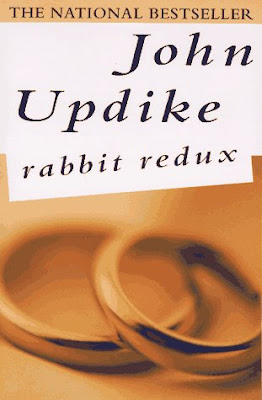
The second of John Updike's four Rabbit novels is a marked departure from the first. Rabbit Run was a muted exploration of desperation, infidelity and personal tragedy. The novel's characters, especially its protagonist, ex-basketball star Harry Angstrom, were highly-flawed and starkly drawn, with none of their weak spots spared from Updike's incisive prose.
Rabbit Redux instead is nearly a thriller by comparison. The plot is packed with action and occurrences. There are more characters involved, including Rabbit's sister, only mentioned in the first novel. The novel begins with an incredibly likely event: Janice cheating on Rabbit after a decade of neglect, but from that starting point branches off into a series of misdeeds, both sexual and personal, that are, frankly, incredible in both senses of the word. However, where they strain your suspension of disbelief they do tickle that voyeuristic sense that we all bring into fiction, and the result is a page-turner that will have you saying "No way!" and "Oh my God, what happens now?" in equal measure.
The novel was published in 1971 and set two years earlier, against the backdrop of the moon landing, a fact which makes the novel's sense of nostalgia somewhat creepy. Updike continually mentions what movies are in theaters and what teams are in the World Series, as though he were writing the novel today and trying to prove he'd done the research. Many of the novels conversations are protracted arguments about the nature of the conflict in Vietnam, with Rabbit's own support challenged both by his wife's lover and by a black veteran named Skeeter who fits right into the proud tradition of ungrateful house-guests.
Rabbit's home life in the bulk of the novel is the main source of the novel's near-absurdity. Whether Updike is trying to shock his readers or accurately reflect contemporary sexual freedom through his depiction of the trysts between Rabbit and Jill, an 18-year old runaway who brings Skeeter into the house, I can't know. Perhaps the most likely explanation is that Updike is subtly trying to suggest a nervous breakdown, that is perhaps the only way to make sense of the novel's resolution, which in any case left me somewhat disappointed and angry at Rabbit.
Updike only briefly pauses to reflect on the effect Rabbit's free-swinging lifestyle has on his son Nelson, and at times both Skeeter and Jill seem shockingly unhuman, especially when they rattle off deep political and personal monologues which seem written out for them instead of naturally delivered.
Also, on a more nit-picky note, Updike's sex scenes are so horribly awkward and stilted that it really takes you out of the book.
Anyway, the book is a thrilling and mostly well-written look at a time and a place through the lens of a compelling character like Rabbit. However, it lacks the heartbreak and subtlety of Rabbit, Run and so it earns only a 6.6 out of 10.
Next? I don't possess the other two Rabbit novels, but I suppose I could run out and get them. I definitely want to read them at some point. Otherwise, I still have Midnight's Children, Bleak House, and a lot more here at home.


No comments:
Post a Comment